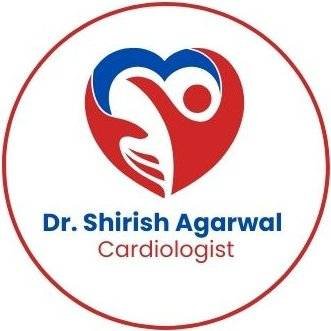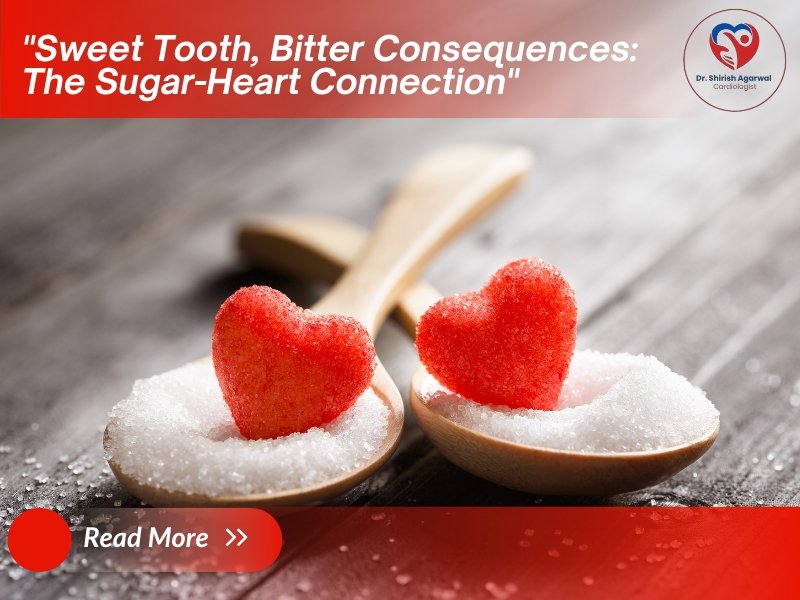There was a time when my niece, Aanya (aged 12), innocently asked me over breakfast, “Why can’t I have that chocolate muffin every day?” Her question struck me and made me think deeply about sugar and heart health. We all know sweets taste good, but what if those daily treats quietly harmed our hearts? Zara sochiye, agar har din ki mithaas humare dil par bojh ban jaye to?
This is exactly the connection Dr. Shirish Agrawal, a leading cardiologist practicing at Shalby Hospital, Indore, warns about in his consultations. As someone who has treated patients with heart damage from sugar-driven metabolic issues, Dr. Shirish Agrawal often says:
In this blog, we’ll explore the effects of sugar on the heart shared by the Best Cardiologist in Indore. We’ll also dive into tips to reduce sugar for heart health, and how you can truly master how to cut sugar without cravings, as advised by Dr. Shirish Agrawal.
Why Sugar Affects the Heart (More Than You Think)
Sugar seems harmless, especially when enjoying sweets occasionally. But when consumed in excess over years, sugar triggers a cascade of harmful effects Dr. Shirish Agrawal often explains these mechanisms to his patients at Shalby Hospital, so they truly understand that the sugar-heart connection is not just a theory, but real, measurable change inside their bodies.
- Insulin resistance & diabetes: High sugar intake forces the body to produce more insulin. Over time, your cells become less responsive, raising your risk of type 2 diabetes a major risk factor for heart disease.
- Obesity & increased fat: Excess sugar is converted to fat. More body fat, especially around the abdomen, places extra demand on your heart to pump blood.
- Elevated blood pressure & cholesterol: Diets high in added sugar are linked with hypertension and unfavorable lipid profiles (e.g. raised triglycerides).
- Inflammation & oxidative stress: Sugar metabolism can cause micro-damage and inflammation in blood vessels, weakening them and accelerating atherosclerosis (plaque formation).
- Heart structural stress: Over time, high sugar driven metabolic changes strain heart muscle, increasing risk for heart failure, arrhythmias, and other structural heart issues.
Real Patient Story: From Sweet Cravings to Heart Attack
Let me share the story of Mr. Mahesh, a 48-year-old businessman from nearby suburbs of Indore. He loved sweets, gulab jamun, ice cream, sugary sodas and believed he could “burn it off” with weekend walks.
One morning, he experienced crushing chest pain and was rushed to Shalby Hospital. After angiography, Dr. Shirish Agrawal found significant blockages in his coronary arteries. The diagnosis? A classic heart attack, likely aggravated by years of sugar overload, poor diet, and insulin resistance.
Under Dr. Shirish Agrawal’s care, Mahesh underwent angioplasty, started on medications, and was counseled intensively on lifestyle changes particularly, how to cut sugar without cravings. Over time, he lowered his blood sugar levels, improved weight, and stabilized his heart.
Top Tips to Reduce Sugar for Heart Health from Dr. Agrawal
When patients ask, “Doctor, can I ever enjoy sweets again?” Dr. Shirish Agrawal responds with a smile: “Yes in moderation, if you train your palate and manage cravings.” Here are his favorite tips (tested with many patients):
|
Tip |
Why It Works | Practical Measure |
|
Start by tracking your sugar |
We often consume hidden sugar (soups, sauces, packaged foods) | Keep a 7-day sugar diary: note down any sweetened drinks, desserts, sauces |
|
Replace sweeteners smartly |
Lower glycemic alternatives reduce insulin spikes |
Use small amounts of stevia, or fruit purée instead of sugar |
|
Pair sweets with protein/fiber |
Helps blunt blood sugar peaks |
Have your dessert after a meal rich in protein (dals, eggs, paneer) |
|
“Sweet substitution” approach |
Rewires your taste buds over time |
Use naturally sweet foods like berries, dates, dark chocolate (70%+) |
|
Deliberate delay technique |
Cravings often fade if you wait 10–15 minutes |
When craving hits, sip water; distract with a walk or phone call |
|
Scheduled treats, not habits |
Total restriction can backfire |
Allow a small treat once or twice a week, controlled portion |
| Mindful eating & no distraction | Helps you truly taste and be satisfied |
Eat dessert slowly, without phone or TV distractions |
| Hydration & sleep | Dehydration and poor sleep increase cravings |
Drink 2–3 liters water, aim for 7–8 hours of quality sleep |
Using these tips to reduce sugar for heart health, Dr. Shirish Agrawal has helped countless patients in Indore and nearby areas improve sugar control and reduce cardiac risk.
How to Cut Sugar Without Cravings Step by Step
Cutting sugar is not a one-day deed. Here’s a gentle, step-by-step roadmap inspired by Dr. Agrawal’s counselling approach:
- Wean off gradually: Start by cutting out obvious sugar sugary drinks, sweets after meals for a week.
- Lower hidden sugars: Swap processed snacks, sauces, breakfast cereals.
- Introduce healthy flavor enhancers: Use cinnamon, cardamom, vanilla, citrus zest to make meals more enjoyable.
- Stabilize blood sugar with balanced meals: Always include complex carbs + protein + healthy fat to avoid sugar dips (and cravings).
- Use the “80/20 rule”: 80% meals are clean, 20% is “free space” to enjoy occasional treats.
- Track progress & relapses: Celebrate small wins one fewer soda per week and learn from slip-ups, not shame them.
- Stay accountable: Share goals with friends/family, or maintain follow-ups with Dr. Agrawal or a dietitian.
Over ~2–3 months, many of Dr. Shirish Agrawal’s patients report that their “sweet cravings” diminish and they begin to appreciate natural flavors more. That’s when you truly learn how to cut sugar without cravings.
Effects of Sugar on Heart: What Science & the Best Cardiologist in Indore Agree
Let’s look at the specific heart-related consequences, drawing from Dr. Shirish Agrawal’s clinical experience:
- Coronary artery disease: Chronic high sugar fosters plaque buildup in coronary arteries, increasing risk of heart attacks.
- Heart failure: Metabolic stress and poor glucose control can weaken heart muscle function over time.
- Arrhythmias & conduction blocks: Excess sugar and inflammation may damage cardiac conduction pathways, sometimes necessitating a pacemaker.
- Hypertension & stroke risk: Sugar contributes to high blood pressure, which in turn stresses heart and vascular health.
- Microvascular disease: Small vessel damage (capillaries) in the heart reduces circulation, causing silent ischemia or angina.
Dr. Shirish Agrawal, who performs advanced procedures like angioplasty, rotablation, IVL, and pacemaker implantation, often combines procedural treatment with sugar-control counseling. The rationale: treating the blockages is necessary, but preventing new ones (by managing sugar) is equally vital.
What You Can Do: Proactive Steps (Guidance from Dr. Agrawal)
If you’re reading this and thinking “Could sugar be hurting my heart?” here are action steps:
- Book a heart check-up with Dr. Shirish Agrawal at Shalby Hospital, Indore including ECG, 2D Echo, TMT, Holter monitoring, and lipid/glycemic profile.
- Review your diet: Use the hunger–fullness scale and lower sweet foods gradually.
- Move more: Walk, cycle, or choose active time over screen time.
- Sleep & stress: Prioritize 7–8 hours of sleep; manage stress (yoga, meditation).
- Stay consistent: Sugar control is a long game. Relapses happen to get back on track without guilt.
- Support network: Share goals with your family; kids & spouse can help you avoid sugar temptations.
By combining these habits with the medical supervision of a cardiologist like Dr. Agrawal, you substantially reduce your chance of needing advanced interventions like angioplasty, device closure, or a pacemaker in the future.
FAQ Answered by Best Cardiologist in Indore
Q: What are the main effects of sugar on the heart I should worry about?
Sugar raises your risk of coronary artery disease, heart failure, hypertension, arrhythmias, and microvascular damage all of which can compromise overall cardiovascular health.
Q: Can I ever enjoy sweets again?
Yes, but in moderation. Using the tips to reduce sugar for heart health (e.g. delay technique, scheduled treats, healthier substitutes), you can retrain your palate without feeling deprived.
Q: How quickly will I feel a difference if I cut sugar?
Many patients of Dr. Shirish Agrawal report improved energy, better weight, more stable sugar readings, and occasional lowering of blood pressure within a few weeks. Heart benefits (arterial healing) take months to years.
Q: Will cutting sugar alone solve heart problems?
No, sugar control is one pillar. You still need to manage blood pressure, cholesterol, smoking cessation (if applicable), weight control, and regular checkups with imaging or monitoring (e.g. ECG, 2D Echo, Holter).
Q: Why is it difficult to stop sugar cravings?
Sugar acts on the same reward pathways in your brain as some addictive substances. Cravings often peak around 10–15 minutes and gradually fade which is why deliberate delay technique helps. Over time, your brain adapts to lower sugar zones and cravings lessen.
Q: How is Dr. Shirish Agrawal different from other cardiologists?
Dr. Agrawal not only treats patients with procedures (angiography, angioplasty, pacemaker implantation, rotablation, IVL, TAVI, device closure), but he also emphasizes prevention and education ensuring patients understand how to cut sugar without cravings, lifestyle changes, and ongoing heart care.
Bringing It All Together
Aanya’s innocent question about sweets led us into a deeper conversation: sugar is more than a treat it’s a powerful substance that, when misused, can quietly damage the heart. As the Best Cardiologist in Indore, Dr. Shirish Agrawal has witnessed firsthand the consequences of sugar mismanagement from blockages requiring angioplasty to pacemaker implants in advanced conduction disease.
But hope remains. With understanding, gradual change, and practical strategies the tips to reduce sugar for heart health and mastery of how to cut sugar without cravings you can reclaim control over your heart’s destiny.
Rather than fearing sugar forever, learn to live wisely with it. Let the story of patients like Mahesh inspire you: even after a cardiac event, life can improve dramatically with discipline, support, and expert guidance.
If you live in or around Indore and want to take a proactive step, consult Dr. Shirish Agrawal at Shalby Hospital. Book diagnostics like 2D Echo, TMT, Holter monitoring, and start your tailored plan to reduce sugar, heal your metabolism, and protect your heart.
May your sweet moments be joyful and your heart, safe.

